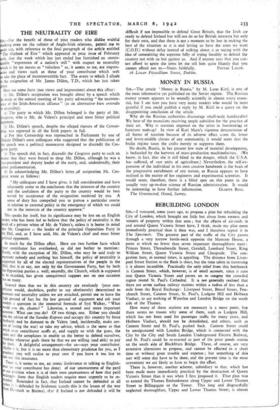THE NEUTRALITY OF EIRE
az,—For the benefit of those of your readers who dislike wishful 'ng even on the subject of Anglo-Irish relations, permit me to out, with reference to the final paragraph of the article entitled The Outlook of Eire " -which appeared in your issue of February th, that the week which has just ended has furnished an unmis- ble " expression of a nation's will " with respect to neutrality ch is by no means as " valueless " as, it seems to me, are impres- ons and views such as those of your contributor which seek take the place of incontrovertible fact. The event to.which I allude s the resignation of Mr. James Dillon, T.D., which has just taken lace.
Here are some facts (not views and impressions) about this affair :
(1) Mr. Dillon's resignation was brought about by a speech which e made at the annual meeting of his party advocating " the mainten- nce of the Irish-American alliance " (as an alternative- bien enrendu neutrality).
(2) The party to which Mr. Dillon belonged is the party of Mr. sgrave, who is Mr. de Valera's principal and most bitter political ponent.
(3) Mr. Dillon's speech, despite the alleged rigours of the Censor- p, was reported in all the Irish papers in full.
(4) For this Censorship was reproached in Parliament by one of puty Dillon's own colleagues who suggested that the publication of e speech was a politic.' manoeuvre designed to discredit the Cos- ye party.
(5) The speech did, in fact, discredit the Cosgrave party to such an xtent that they were forced to drop Mr. Dillon, although he was a ice-president and deputy leader of the carry, and, undoubtedly, their blest parliamentarian.
(6) In acknowledging Mr. Dillon's letter ,of resignation Mt. Cos- grave wrote as follows:
" My colleagues and I have gives. it full consideration and have reluctantly come to the conclusion that the interests of the country and the usefulness of the party to the country would be best served by acceptance of the resignation tendered by you A sense of duty has compelled you to pursue a particular course in relation to external policy in the emergency of which we could not in the interests of the country approve."
This speaks for itself, but its significance may be lost on an English der, who has been led to believe that the policy of neutrality is the ult of a private whim of Mr. de Valera's, unless it is borne in mind at Mr. Cosgrave is the leader of the principal Opposition Party in e Dail, and, as I have said, Mr. de Vakra's chief and most bitter lineal opponent.
So much for the Dillon affair. Here are two further facts which your contributor has overlooked, or did not bother to mention: rstly, with the exception of Mr. Dillon, who may be said truly to epresent nobody and nothing but himself, the policy of neutrality is upported by all of the elected representatives of the people in the Dail, that is to say, not only by.the Government Party, but by both e Opposition parties a_ well; secondly, the Church, which is supposed be muzzled, has given unequivocal suppers . not on one occasion but on many.
Granted then that we in this country are resolutely (your con- butor would, doubtless, prefer to say obstinately) determined to taro our neutrality unless we are attacked, permit me to leave the igh ground of fact for the low ground of argument and ask your s. a question in the immortal formula of Syd Walker, " What 'mild you do, chums? " Likewise, a second and more important nestion: What can you do? Of two things, one. Either you should e the advice of the Sunday Express and occupy this country by force on/midi and be damned to de Valera (and, incidentally, make cer- tain of losing the war) or take my advice, which is the same as that Inch your contributor scoffs at, and supply us with the guns, the tanks and the aeroplanes to enable us the better to defend ourselves, thanking whatever gods there be that we are willing (and able) to pay „Or them. A delightful arrangement—for us--says your contributor. maybe it is, but it is no more than elementary prudence for you, as I
esy you will realise to your cost if you leave it too late to take out this insurance.
There is, it seems to me, an ironic irrelevance in talking to English- en (as your contributor has done) of our unawareness of the peril our position when it is of their own unawareness of how that peril dangers them that English readers require most urgently to be re- inded. Reminded in fact, that Ireland cannot be defended at all trkss it is defended by Irishmen (surely this is the lesson of the war nrn Denmark to Burma), that if Ireland is not defended it will be
difficult if not impossible to defend Great Britain, that the Irish are ready to defend Ireland but will not do so for British interests but only for their own, and that there is not a moment to be lost in making the best of the situation as it is and letting us have the arms we want (C.O.D.) without delay instead of sulking about it or toying with the idea of committing the supreme folly of trying forcibly to defend the country not with us but against us. And if anyone says that you can- not afford to spare the arms let me tell him quite bluntly that you


























 Previous page
Previous page